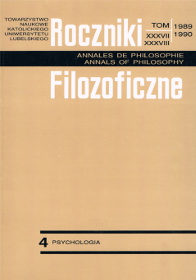Psychologiczna analiza sumienia skrupulatnego. Próba typologii
Abstrakt
In modern times scruples are treated as a neurotic symptom which can have various expressions and intensities. Researchers investigating neuroses have indirectly gathered relatively rich and generally accepted empirical data concerning scruples, but they differ in explanations of this phenomenon depending on their theoretical orientation. The aim of the article is to describe various manifestations of the scrupulous conscience and to suggest a typology of scruples. Scruples are not uniform in their character; they occur in various forms. In principle such questions as etiology or therapy of scruples have been left out in the article. These problems are discussed in my work Sumienie skrupulatne. Studium psycholo- giczne (The Scrupulous Consience. A Psychological Study) 1993. However, since pointing to the psychological mechanisms underlying the discussed symptoms belongs to the characteristics of particular types, I quote some hypotheses explaining the origin of those types without going into detailed and critical discussion of them. The phenomenon of scruples is situated on the borderland of mental health and they should not be called mental or nervous illness, but a disturbance in the moral-psychological functions of man. Accepting scruples as a neurotic symptom we must stress that they do not occur in every neurosis since not every neurotic symptom has moral contents and not every neurosis deforms the conscience. In the diagnosis of the scrupulous conscience three components are distinguished: a) doubts and hesitations in moral evaluations; b) irrational fears; frequently a neurotic sense of guilt; c) an obsessive-compulsive character of this state. To a certain degree scruples disturb the psychological functions of the person who experiences them and they have a significant effect on his moral and religious life. Scruples are connected with the work of various personality defensive mechanisms, most frequently that of repression, but also of rationalization, compensation, identification which is conditioned by various factors causing neuroses which usually have their origin in child-rearing processes. However, the mechanism of repression underlies most neuroses, so it is not a good discriminating factor. Hence a joint criterion has been suggested in which the defensive mechanism and the dominating symptoms like emotions and other characteristic reactions have been taken into consideration as far as it was possible. In the article the following types of scruples have been suggested: transitional ones, ones with dominating symptoms of fear, with dominating symptoms of the obsessive neurosis, with dominating sense of guilt, scruples of "dependence", compensatory, and identification ones. Reflections on the scrupulous conscience make it possible to look at the limitations which are imposed on conscience by various factors causing neuroses as well as deforming personality, especially in early childhood. We often speak about "the voice of conscience"; in the analyses conducted in the article it has been stressed that a conscience deformed by scruples modifies the meaning of this voice.
Copyright (c) 1990 Roczniki Filozoficzne

Utwór dostępny jest na licencji Creative Commons Uznanie autorstwa – Użycie niekomercyjne – Bez utworów zależnych 4.0 Międzynarodowe.





